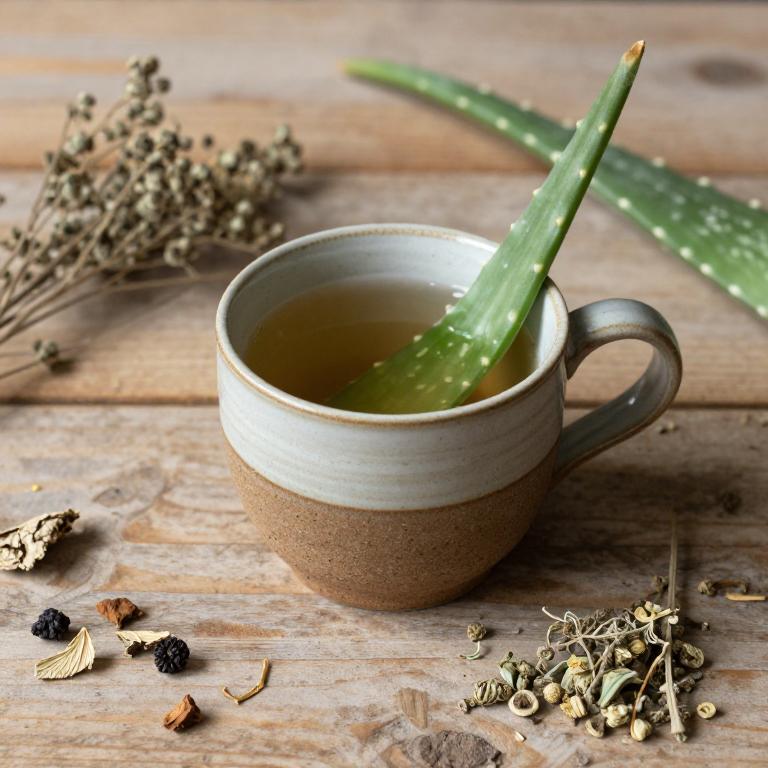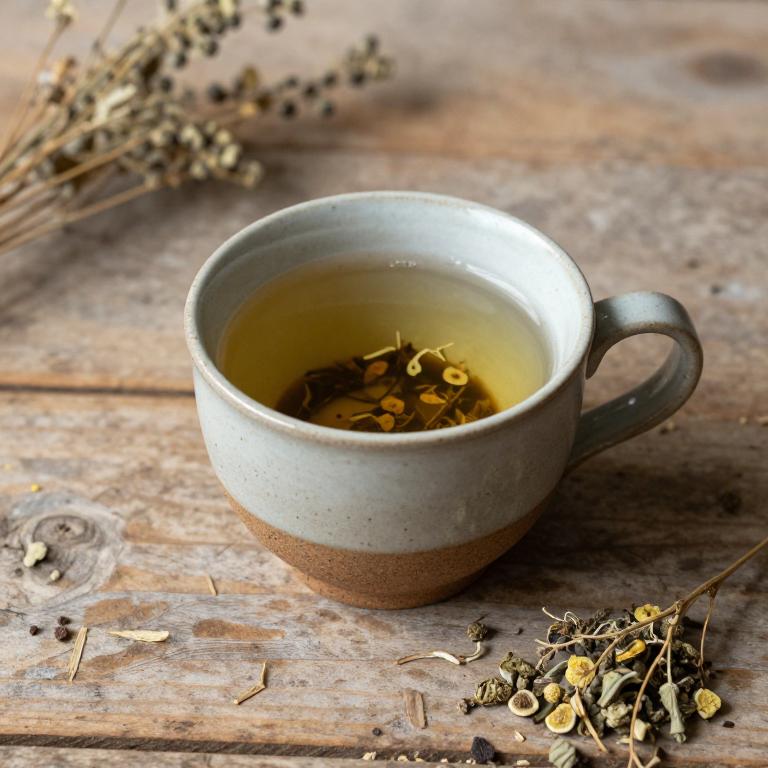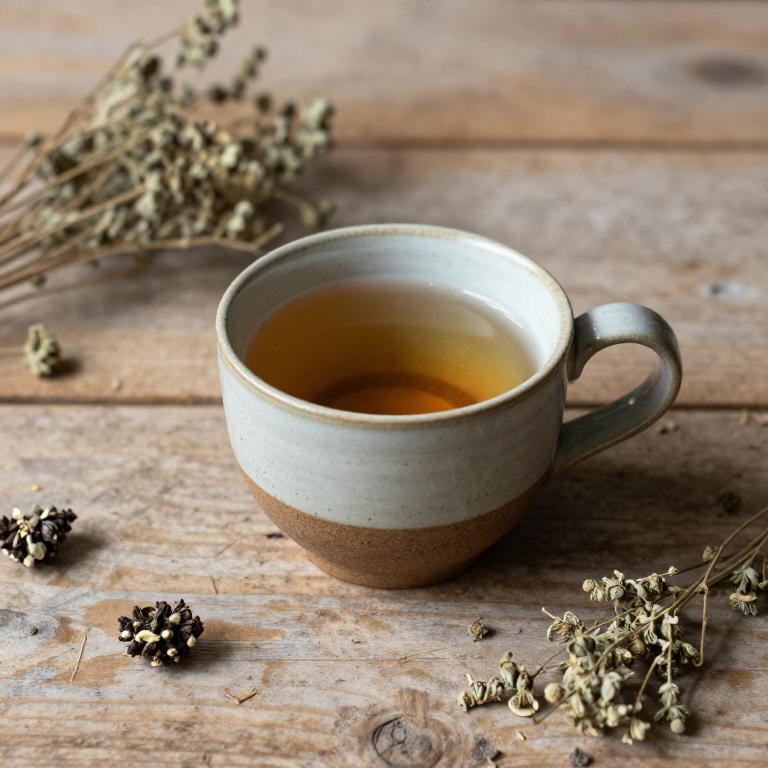10 Best Herbal Teas For Hair Fall

Herbal teas have gained popularity as natural remedies for hair fall due to their soothing and nourishing properties.
Ingredients like hibiscus, nettle, and chamomile are commonly used in these teas because they are rich in vitamins, minerals, and antioxidants that promote scalp health. Regular consumption of herbal teas can help strengthen hair follicles and reduce stress, a common contributor to hair loss. Additionally, applying the brewed tea directly to the scalp can provide a calming effect and stimulate blood circulation.
Overall, herbal teas offer a gentle, holistic approach to managing hair fall, complementing traditional hair care routines.
Table of Contents
- 1. Field horsetail (Equisetum arvense)
- 2. Aloe vera (Aloe barbadensis)
- 3. Stinging nettle (Urtica dioica)
- 4. Bacopa (Bacopa monnieri)
- 5. Salvia (Salvia officinalis)
- 6. Centella (Centella asiatica)
- 7. Chaste tree (Vitex agnus-castus)
- 8. Rosemary (Rosmarinus officinalis)
- 9. English lavender (Lavandula angustifolia)
- 10. Turmeric (Curcuma longa)
1. Field horsetail (Equisetum arvense)

Equisetum arvense, commonly known as field horsetail, is a herb that has been traditionally used in herbal teas to address hair fall due to its high concentration of silica, which strengthens hair follicles.
The silica content in horsetail tea helps improve the overall health of the scalp and promotes stronger, healthier hair growth. This herbal tea is also rich in antioxidants and minerals like potassium and magnesium, which can nourish the scalp and reduce breakage. When consumed regularly, horsetail tea may support hair regrowth and reduce the likelihood of excessive shedding.
However, it is important to consult with a healthcare professional before incorporating it into your routine, especially if you have underlying health conditions or are on medication.
2. Aloe vera (Aloe barbadensis)

Aloe barbadensis, commonly known as aloe vera, is widely used in herbal teas for its potential benefits in reducing hair fall.
This plant contains essential nutrients such as vitamins, minerals, and amino acids that promote scalp health and strengthen hair follicles. When consumed as a tea, aloe vera may help improve blood circulation to the scalp, which can encourage hair growth and reduce breakage. Its anti-inflammatory and soothing properties also help alleviate dandruff and scalp irritation, common contributors to hair loss.
While more research is needed, many users report positive results from incorporating aloe vera tea into their hair care routine.
3. Stinging nettle (Urtica dioica)

Urtica dioica, commonly known as stinging nettle, is a herbal plant that has been traditionally used for its potential benefits in promoting hair health.
When brewed into a herbal tea, it is believed to help reduce hair fall by strengthening hair follicles and improving scalp circulation. The tea contains nutrients such as silica, iron, and vitamins that support hair growth and thickness. Regular consumption of stinging nettle tea may also help balance the body's mineral levels, which can contribute to healthier hair.
However, it is advisable to consult a healthcare professional before incorporating it into a hair care routine, especially for those with existing health conditions or allergies.
4. Bacopa (Bacopa monnieri)

Bacopa monnieri, also known as Brahmi, is a traditional Ayurvedic herb that has been used for centuries to support cognitive function and overall wellness.
When brewed into a herbal tea, bacopa monnieri is believed to promote hair growth and reduce hair fall due to its rich content of antioxidants and nutrients that nourish the scalp and hair follicles. The herb is thought to enhance blood circulation to the scalp, which can stimulate hair growth and strengthen hair strands. Regular consumption of bacopa monnieri tea may help in reducing stress, a common contributor to hair loss, thereby supporting healthier hair.
However, it is important to consult a healthcare professional before incorporating this herb into your routine, especially if you have existing medical conditions or are taking other medications.
5. Salvia (Salvia officinalis)

Salvia officinalis, commonly known as sage, is a versatile herb that has been traditionally used for its various health benefits, including its potential to reduce hair fall.
Herbal teas made from sage leaves are believed to nourish the scalp and strengthen hair follicles, promoting healthier hair growth. The essential oils in sage contain compounds like thujone and camphor, which may help improve circulation to the scalp and reduce inflammation. Regular consumption of sage tea may also help balance hormonal levels, which can contribute to hair loss.
While more research is needed, many people report positive results from incorporating sage herbal tea into their hair care routine.
6. Centella (Centella asiatica)

Centella asiatica, also known as gotu kola, is a traditional herbal plant that has been used for centuries in Ayurvedic and Chinese medicine for its skin-healing and hair-repairing properties.
Centella asiatica herbal tea is believed to promote hair growth by improving scalp circulation and strengthening hair follicles, which can help reduce hair fall. The tea contains compounds like asiatic acid and madecassic acid that support the regeneration of skin and hair tissues. Regular consumption of centella asiatica tea may also help reduce stress, a common contributor to hair loss, thereby supporting overall hair health.
While more research is needed, many users report positive results when incorporating this herbal tea into their hair care routine.
7. Chaste tree (Vitex agnus-castus)

Vitex agnus-castus, commonly known as chaste tree, is a herbal remedy that has been traditionally used to support hormonal balance, which can play a significant role in hair health.
Herbal teas made from vitex are believed to help regulate estrogen levels, potentially reducing hormonal fluctuations that contribute to hair loss. These teas may also promote circulation to the scalp, enhancing nutrient delivery to hair follicles and supporting stronger, healthier hair growth. While scientific evidence is limited, many users report improved hair thickness and reduced shedding after regular consumption of vitex tea.
As with any herbal supplement, it is advisable to consult with a healthcare provider before incorporating vitex into a hair care routine, especially for those with pre-existing medical conditions or who are pregnant.
8. Rosemary (Rosmarinus officinalis)

Rosmarinus officinalis, commonly known as rosemary, is a popular herb used in herbal teas to promote hair health and reduce hair fall.
The essential oils in rosemary, such as cineole and camphor, are believed to stimulate blood circulation in the scalp, which can enhance hair growth and strengthen hair follicles. Regular consumption of rosemary herbal tea may help nourish the scalp and improve the overall condition of the hair. It is often combined with other herbs like lavender or peppermint to enhance its benefits for hair care.
However, it is advisable to consult a healthcare professional before incorporating rosemary tea into a hair care routine, especially for those with sensitive skin or specific medical conditions.
9. English lavender (Lavandula angustifolia)

Lavandula angustifolia, commonly known as English lavender, is widely used in herbal teas for its calming and therapeutic properties.
When brewed into a tea, it can help reduce stress, which is a common contributor to hair fall. The essential oils in lavender promote scalp health by improving blood circulation and reducing inflammation. Regular consumption of lavender tea may strengthen hair follicles and encourage healthier hair growth.
As a natural remedy, lavender tea offers a gentle and effective option for those seeking to address hair loss through holistic means.
10. Turmeric (Curcuma longa)

Curcuma longa, commonly known as turmeric, is widely used in herbal teas to promote hair health and reduce hair fall.
The active compound in turmeric, curcumin, possesses strong anti-inflammatory and antioxidant properties that help strengthen hair follicles and improve scalp health. When consumed as a herbal tea, curcuma longa can enhance blood circulation to the scalp, which supports hair growth and prevents premature shedding. Regular consumption of turmeric tea may also help balance sebum production and reduce dandruff, common contributors to hair loss.
However, it is advisable to consult a healthcare professional before incorporating turmeric into your routine, especially if you have sensitive skin or existing health conditions.